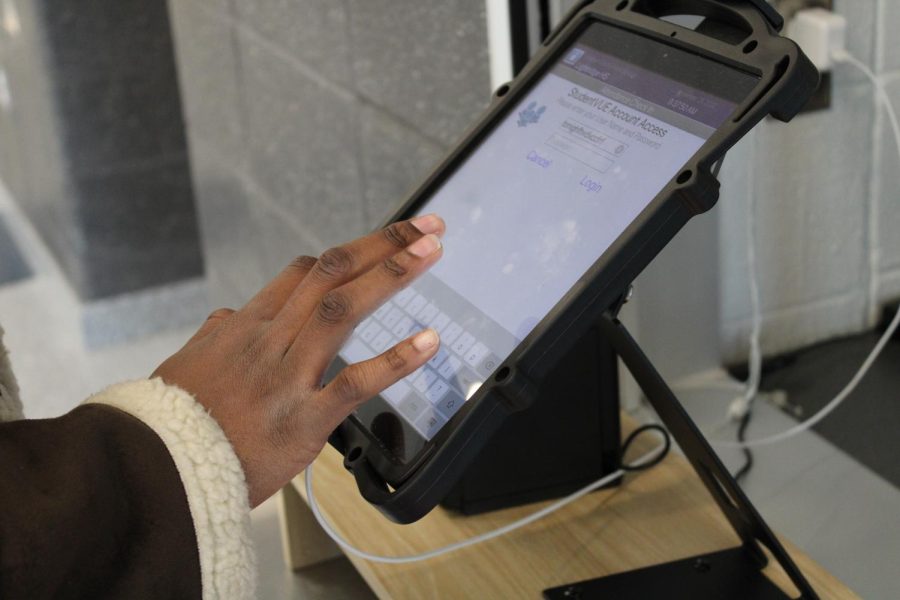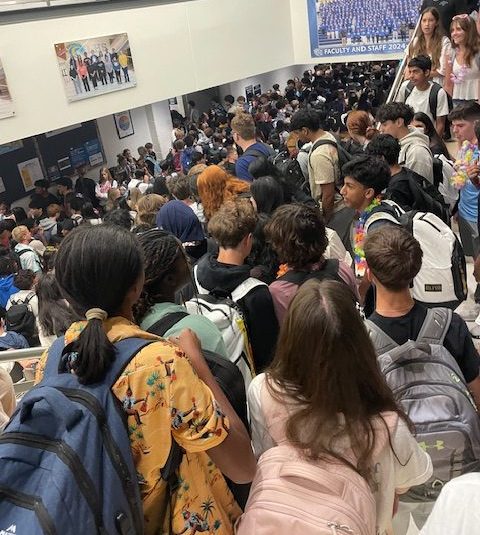No time for Lightridge tardy policy
A student checks at the attendance office kiosk after arriving late to school.
November 28, 2022
When Akshit Kumar, a 10th grader at Lightridge High School, found out his father’s car had broken down, his first thoughts weren’t, “how will the car be fixed” or, “how will my dad get to work?” The first thing that came to his head was, “I’m going to get written up for being late.”
Kumar’s story isn’t uncommon. High school students at many LCPS schools are facing the backlash of the stricter tardy policy enforced at the beginning of the 2022-2023 school year. The tardy policy newly adopted by Lightridge has been controversial among students because of the addition of the threat of detention for those who are deemed to have an excessive amount of tardies.
However, there are problems with this. The tardy policy is blind to the circumstances that occur in the morning and deals a heavy hand to even those who couldn’t control their situations.
“The fact that they give you unexcused tardies for some reasons like construction or traffic or, you know, vehicle issues, I mean, that can be unfair sometimes because that may not always be your fault,” explains Kumar.
Kumar’s complaint does have merit. From the time the first bell rings you can already see lines of students waiting to be marked as tardy by the attendance officer, without the courtesy of getting the chance to explain their reason for being late.
The Lightridge website curtly explains the need for strict attendance guidelines as “Promptness to class is essential for maintaining instructional consistency, which promotes learning.”
However, is it not also essential to have eager and willing students whose educational experience is not hampered by the threat of punishment because of an off day or something out of their control?
The tardy policy, as explained by Dr. Felicia Lewis, assistant principal at Lightridge High School, is “when students come after 9:30, they have to check in at the kiosk with Mrs. Ahmad. And what happens is, if a student is tardy, it shows up in their Studentvue, parents are notified if it’s an unexcused tardy, and then the student takes a little slip, and they go to class, so the teacher knows that they’ve checked in.”
The problem with this method, for non-recurrent tardies, is that a student never gets a chance to explain themselves to administration. While it may be a small blemish on their record, it still causes stress for the rest of the day as they worry what will happen next time if they possibly get a tardy.
Lewis explains more serious actions come “when a student repeatedly is late to class, it usually signifies that there’s something going on…it kind of sends us a message that we need to check in with the student. So sometimes our kids are in athletics, sometimes they work. Sometimes they just don’t get up and they need a reminder to get up. Sometimes they have trouble getting to school…and that check in could just be a conversation. It could be a phone call home to make sure everything’s okay. It could be a lunch detention, depending on how many times it’s occurred.”
Why is it that conversation only happens after multiple offenses? Instead of finding out why the student is late early on and addressing the situation, the student is then potentially punished for what is previously mentioned as not delinquent activities but instead life circumstances.
I believe that there are good intentions in this policy. Administration is trying to ensure quality education through repeated attendance, however, the way this policy is enforced seems to produce negative consequences, as we have students at Lightridge who are now much more stressed then they were last year concerning their attendance.
Kumar states that the tardy policy has him” in a sense of urgency” during the morning. Is that really a necessary state for our students to be in?
When it comes down to it, this is a matter of the ethics of positive punishment in education. Positive punishment describes adding a stimulus in order to decrease a behavior. In this situation the stimulus being added would be the phone call home or the lunch detentions in order to decrease the behavior of coming to school late. While positive punishment has shown to be effective in the short term, it is not effective long term as it leads to only a temporary resolution and fear in the one being conditioned.
This is evident in high schoolers dealing with the tardy policy as they aren’t truly changing their behaviors and learning to be more productive with their time, they are instead just fearing the immediate consequences that will occur at the school.
It is still necessary to have teens be accountable for their attendance. It would be wise to propose a system that focuses on teens holding themselves accountable for their tardiness.
Many say that punishing teens for being tardy prepares them for the future, but in college there is no obligation to attend your classes, your professors will not scold you. Instead we should focus on intrinsic motivators for teens to realize the value of coming to school on time and at the same time they will not be punished for being tardy for things out of their control.
As for now, Lightridge will continue punishing students for the mistrials of the morning, not giving thought to each unique path a student might take to get to school, whether on time or late.
But as for Kumar, he thinks it’s time for change.
“I think that they should be slightly more lenient, and they should (be) more understanding depending on your circumstance,” said Kumar. “Because some people may not have …the same situations at home (as) others. So it may not be fair to everyone for the same requirements (as) yourself.”






